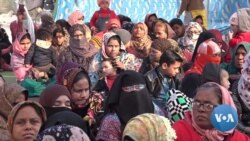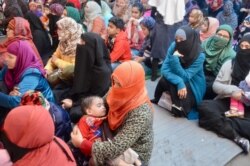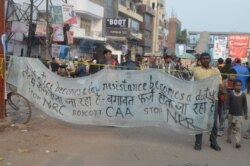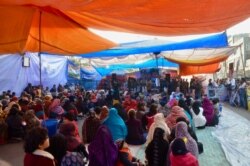NEW DELHI — Hundreds of women once again blocked a key road in the Muslim-dominated Shaheen Bagh neighborhood of New Delhi on Thursday in their ongoing protest against India's new citizenship law.
Grandmothers, young mothers with babies in their arms, and housewives squatted in rows. Mostly from marginalized sections of society, many, like Rizwana Bano, have emerged from poor Muslim homes gripped with worry that they will be asked to submit documents to prove they are Indian citizens.
"I am from Bihar, where there are always floods. I don't have a house or a fixed address. What proof can I give?" she asked. Bano is one of millions of migrants in Delhi. Her husband works as a driver.
"That is why I have come on the road, so that I don't have to go to jail," she said.
Many fear that the new law, which grants expedited citizenship to "persecuted minorities" from Afghanistan, Pakistan and Bangladesh, sets the stage for the government to initiate a national registry of citizens. They worry that Muslims will be more vulnerable to harassment if they cannot submit documents — which the poor often do not possess — because Islam is excluded from the new law.
Led by Muslim women, many from conservative homes, this is one of the most unusual protests that has wracked India in the aftermath of the new law, which critics say violates India's secular constitution by introducing religion as a criterion for citizenship.
Across India, 23 people have died in protests, mostly in the northern state of Uttar Pradesh, as violence erupted during some demonstrations.
For nearly three weeks, the women have camped out in a makeshift tent erected on this arterial road that connects New Delhi to the satellite town of Noida. The protests have disrupted traffic but otherwise have remained peaceful.
Men stand on the sidelines as speakers talk about what they perceive as dangers of the new law.
"There is no financier, no political party, no NGO (voluntary group) that is backing these protests," said Syed Taseer Ahmed, a volunteer. "This is the public out on their own."
Celebrities occasionally turn up to lend support to what is being called a "leaderless protest." On Wednesday, Bollywood actress Swara Bhaskar called on the crowd to persevere. An army of volunteers has been distributing food, tea and water to protesters who have sat for hours. Some, like Gurnoor Kaur, a postgraduate student from Delhi University, turns up with food packets paid for by a friend. She has donated about $15 to show solidarity.
Posters and banners are everywhere, calling for the scrapping of the new law. A makeshift stage is scattered with blankets and mattresses used late at night — the protesters often continue past midnight, despite Delhi's chilliest winter in years. They welcomed in the New Year singing the national anthem and waving the Indian flag.
Government outreach
Prime Minister Narendra Modi has said no Indian Muslim risks losing his or her nationality. The country's 200 million Muslims make up about 14% of India's population.
The government is launching an outreach to citizens to dispel what it calls rumors fueled by opposition parties. Top ministers have reiterated that the law is about granting citizenship, not snatching it away. Modi has also said that there has been no discussion by his government on the national citizenship registry.
But fears have been fanned by what happened in the northeastern state of Assam, where nearly 2 million people, including many Muslims, were excluded from a citizens list that was finalized last year under an exercise ordered before the BJP government came to power. A huge question mark hangs on the future of these people, with many fearing they could be hauled off to detention centers.
Analysts say the new citizenship law was the tipping point, deepening anxiety and distrust in Modi's government among critics who say he is pressing ahead with a Hindu nationalist agenda during his second term in power.
Pushed 'to the margins'
In August 2019, the government scrapped the special status of Jammu and Kashmir, its only Muslim-majority state. In September, the Supreme Court paved the way for Hindus to construct a temple on a plot of land where a mosque was razed 25 years ago.
"I have come for a protest for the first time," said Azma Hashmi, a housewife and resident of Shaheen Bagh. "I am from a conservative family where purdah is important. I was born in this beautiful country. My seven generations were born and buried here. Today, why are you pushing us to the margins?"
Saima Khan, a mother of four, comes from an economically well-off background compared to many others. She said she joined the protests because of a recent police action that allegedly injured many students in two Muslim-dominated universities.
"We decided we would not tolerate this. There are lots of mothers here. Mothers cannot see their children being targeted," Khan said.
Protesters like Bilkees, who have been on the road for 19 days, are determined to camp here until the new law is repealed, defying police who have ordered them to clear out.
"Whether I have to stay for a month, six months or one year, I will come every day," said the 82-year-old grandmother — one of the oldest protesters. "I am willing to face any action against us, whether sticks or bullets."









